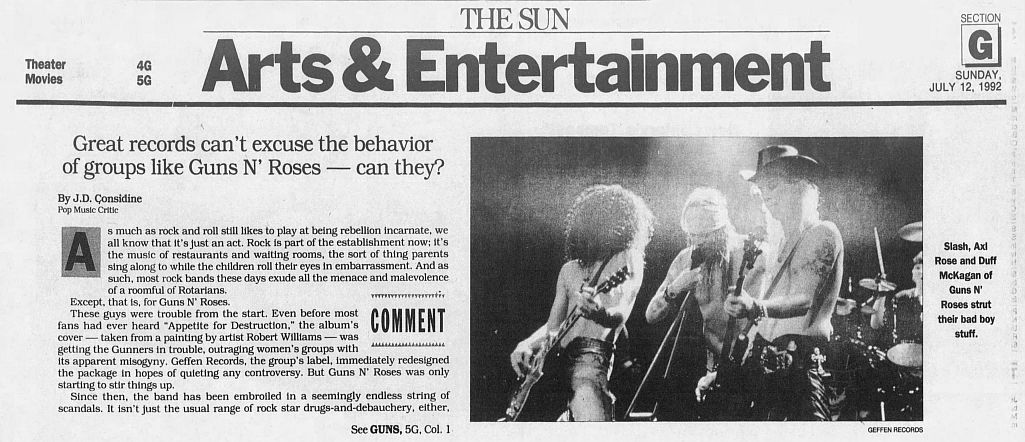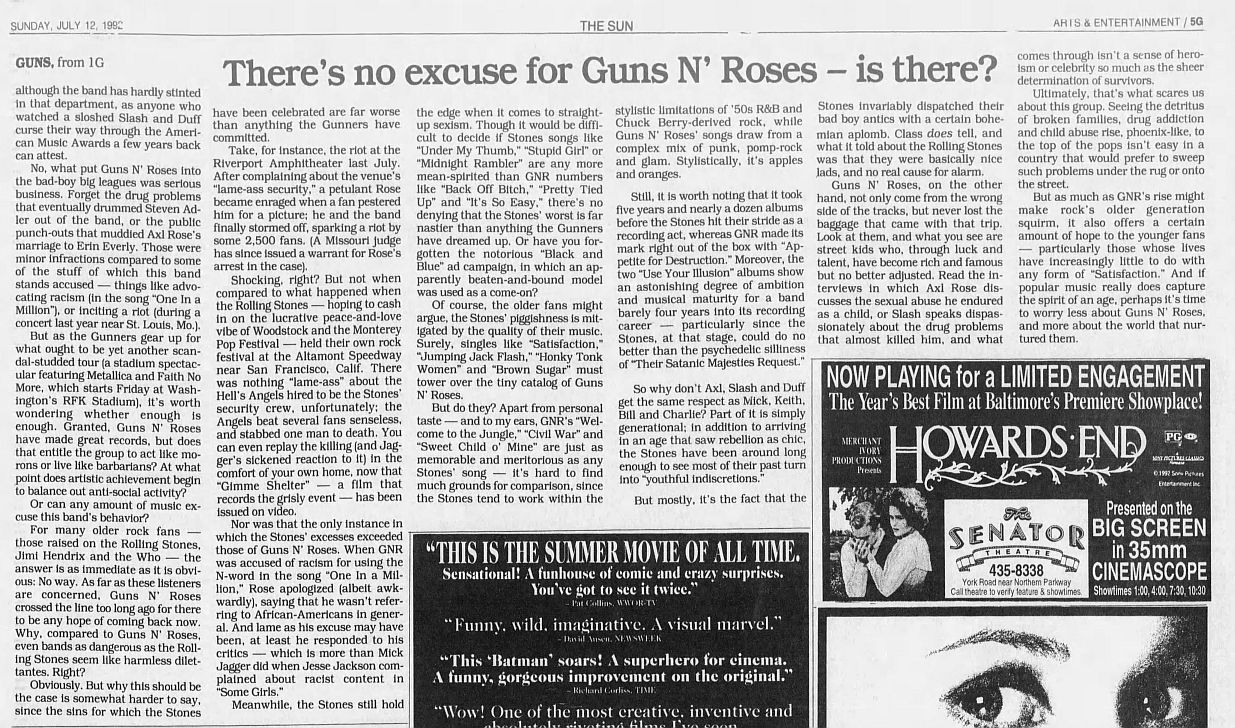1992.07.12 - The Baltimore Sun - Great records can’t excuse the behavior of groups like Guns N’ Roses — can they?
Page 1 of 1
 1992.07.12 - The Baltimore Sun - Great records can’t excuse the behavior of groups like Guns N’ Roses — can they?
1992.07.12 - The Baltimore Sun - Great records can’t excuse the behavior of groups like Guns N’ Roses — can they?


TRANSCRIPTION:
-----------------------
Great records can’t excuse the behavior of groups like Guns N’ Roses — can they?
By J.D. Considine
Pop Music Critic
As much as rock and roll still likes to play at being rebellion incarnate, we all know that it's just an act. Rock is part of the establishment now; it’s the music of restaurants and waiting rooms, the sort of thing parents sing along to while the children roll their eyes in embarrassment. And as such, most rock bands these days exude all the menace and malevolence of a roomful of Rotarians.
Except, that is, for Guns N’ Roses.
These guys were trouble from the start. Even before most fans had ever heard “Appetite for Destruction," the album’s cover — taken from a painting by artist Robert Williams — was getting the Gunners in trouble, outraging women’s groups with its apparent misogyny. Geffen Records, the group’s label, immediately redesigned the package in hopes of quieting any controversy. But Guns N’ Roses was only starting to stir things up.
Since then, the band has been embroiled in a seemingly endless string of scandals. It isn’t just the usual range of rock star drugs-and-debauchery, either, although the band has hardly stinted in that department, as anyone who watched a sloshed Slash and Duff curse their way through the American Music Awards a few years back can attest.
No, what put Guns N’ Roses into the bad-boy big leagues was serious business. Forget the drug problems that eventually drummed Steven Adler out of the band, or the public punch-outs that muddied Axl Rose’s marriage to Erin Everly. Those were minor infractions compared to some of the stuff of which this band stands accused — things like advocating racism (in the song “One In a Million”), or inciting a riot (during a concert last year near St. Louis, Mo.).
But as the Gunners gear up for what ought to be yet another scandal-studded tour (a stadium spectacular featuring Metallica and Faith No More, which starts Friday at Washington’s RFK Stadium), it’s worth wondering whether enough is enough. Granted, Guns Ν' Roses have made great records, but does that entitle the group to act like morons or live like barbarians? At what point does artistic achievement begin to balance out anti-social activity?
Or can any amount of music excuse this band’s behavior?
For many older rock fans — those raised on the Rolling Stones, Jlmi Hendrix and the Who — the answer is as immediate as it is obvious: No way. As far as these listeners are concerned, Guns N’ Roses crossed the line too long ago for there to be any hope of coming back now. Why, compared to Guns N’ Roses, even bands as dangerous as the Rolling Stones seem like harmless dilettantes. Right?
Obviously. But why this should be the case is somewhat harder to say, since the sins for which the Stones have been celebrated are far worse than anything the Gunners have committed.
Take, for instance, the riot at the Riverport Amphitheater last July. After complaining about the venue’s “lame-ass security," a petulant Rose became enraged when a fan pestered him for a picture; he and the band finally stormed off, sparking a riot by some 2,500 fans. (A Missouri Judge has since issued a warrant for Rose's arrest in the case).
Shocking, right? But not when compared to what happened when the Rolling Stones — hoping to cash in on the lucrative peace-and-love vibe of Woodstock and the Monterey Pop Festival — held their own rock festival at the Altamont Speedway near San Francisco, Calif. There was nothing “lame-ass” about the Hell's Angels hired to be the Stones’ security crew, unfortunately: the Angels beat several fans senseless, and stabbed one man to death. You can even replay the killing (and Jagger's sickened reaction to it) in the comfort of your own home, now that “Gimme Shelter" — a film that records the grisly event — has been issued on video.
Nor was that the only instance in which the Stones’ excesses exceeded those of Guns Ν' Roses. When GNR was accused of racism for using the N-word in the song “One In a Million," Rose apologized (albeit awkwardly), saying that he wasn’t referring to African-Americans in general. And lame as his excuse may have been, at least he responded to his critics — which is more than Mick Jagger did when Jesse Jackson complained about racist content in “Some Girls."
Meanwhile, the Stones still hold the edge when it comes to straight-up sexism. Though it would be difficult to decide if Stones songs like “Under My Thumb," "Stupid Girl" or “Midnight Rambler" are any more mean-spirited than GNR numbers like “Back Off Bitch," “Pretty Tied Up" and “It's So Easy," there’s no denying that the Stones’ worst is far nastier than anything the Gunners have dreamed up. Or have you forgotten the notorious “Black and Blue" ad campaign, in which an apparently beaten-and-bound model was used as a come-on?
Of course, the older fans might argue, the Stones’ piggishness is mitigated by the quality of their music. Surely, singles like “Satisfaction,” “Jumping Jack Flash," "Honky Tonk Women” and “Brown Sugar" must tower over the tiny catalog of Guns N’ Roses.
But do they? Apart from personal taste — and to my ears, GNR's "Welcome to the Jungle," “Civil War" and “Sweet Child o' Mine" are just as memorable and meritorious as any Stones’ song — it’s hard to find much grounds for comparison, since the Stones tend to work within the stylistic limitations of '50s R&B and Chuck Berry-derived rock, while Guns N’ Roses’ songs draw from a complex mix of punk, pomp-rock and glam. Stylistically, it’s apples and oranges.
Still, it is worth noting that it took five years and nearly a dozen albums before the Stones hit their stride as a recording act, whereas GNR made its mark right out of the box with “Appetite for Destruction." Moreover, the two “Use Your Illusion" albums show an astonishing degree of ambition and musical maturity for a band barely four years into its recording career — particularly since the Stones, at that stage, could do no better than the psychedelic silliness of "Their Satanic Majesties Request."
So why don’t Axl, Slash and Duff get the same respect as Mick, Keith, Bill and Charlie? Part of it is simply generational; in addition to arriving in an age that saw rebellion as chic, the Stones have been around long enough to see most of their past turn into “youthful indiscretions."
But mostly, it's the fact that the Stones invariably dispatched their bad boy antics with a certain bohemian aplomb. Class does tell, and what it told about the Rolling Stones was that they were basically nice lads, and no real cause for alarm.
Guns N’ Roses, on the other hand, not only come from the wrong side of the tracks, but never lost the baggage that came with that trip. Look at them, and what you see are street kids who, through luck and talent, have become rich and famous but no better adjusted. Read the interviews in which Axl Rose discusses the sexual abuse he endured as a child, or Slash speaks dispassionately about the drug problems that almost killed him, and what comes through isn't a sense of heroism or celebrity so much as the sheer determination of survivors.
Ultimately, that’s what scares us about this group. Seeing the detritus of broken families, drug addiction and child abuse rise, phoenix-like, to the top of the pops isn’t easy in a country that would prefer to sweep such problems under the rug or onto the street.
But as much as GNR’s rise might make rock's older generation squirm, it also offers a certain amount of hope to the younger fans — particularly those whose lives have increasingly little to do with any form of "Satisfaction." And if popular music really does capture the spirit of an age, perhaps it’s time to worry less about Guns Ν' Roses, and more about the world that nurtured them.

Blackstar- ADMIN
- Posts : 13496
Plectra : 88096
Reputation : 100
Join date : 2018-03-17
 Similar topics
Similar topics» 1988.08.12 - The Baltimore Sun - Guns N' Roses (Slash)
» 1995.04.09 - The Baltimore Sun - Slash is touring, not leaving Axl N’ Guns N’ Roses
» 1992.09.05 - Kerrang! - The Man Who Quit Guns N' Roses (Izzy)
» 1992.05.23 - Kerrang - "I Would Have Said No To Guns N' Roses!" (Tracii Guns)
» 2021.03.03 - Revolver Magazine - Guns N' Roses' Duff McKagan Picks 7 Essential Punk And Hardcore Records
» 1995.04.09 - The Baltimore Sun - Slash is touring, not leaving Axl N’ Guns N’ Roses
» 1992.09.05 - Kerrang! - The Man Who Quit Guns N' Roses (Izzy)
» 1992.05.23 - Kerrang - "I Would Have Said No To Guns N' Roses!" (Tracii Guns)
» 2021.03.03 - Revolver Magazine - Guns N' Roses' Duff McKagan Picks 7 Essential Punk And Hardcore Records
Page 1 of 1
Permissions in this forum:
You cannot reply to topics in this forum
